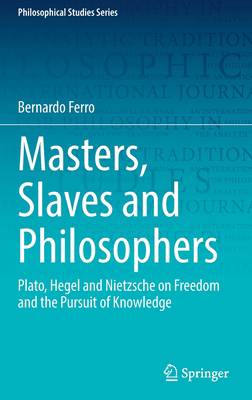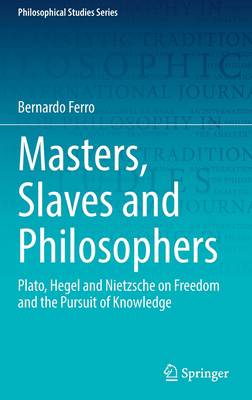
- Retrait gratuit dans votre magasin Club
- 7.000.000 titres dans notre catalogue
- Payer en toute sécurité
- Toujours un magasin près de chez vous
- Retrait gratuit dans votre magasin Club
- 7.000.0000 titres dans notre catalogue
- Payer en toute sécurité
- Toujours un magasin près de chez vous
Masters, Slaves and Philosophers
Plato, Hegel and Nietzsche on Freedom and the Pursuit of Knowledge
Bernardo FerroDescription
This book examines the relationship between freedom and true knowledge, which is a central part of the hotly debated issue of human freedom.
Is truth necessary for the attainment of freedom? Does a free life require a clear understanding of reality? And if so, to what extent? These questions lead back to a classical philosophical debate, of which the first major chapter was written by Plato. In the dialogues, he describes human life as a peculiar form of imprisonment and calls for a global liberation of human cognition. This work analyses this ambitious project and its unique influence on the work of two modern authors, Hegel and Nietzsche, who explicitly linked the notions of ignorance and truth to those of bondage and freedom--or slavery and mastery--and whose philosophies are also centred on the liberation of human consciousness.
Following a historical and systematic approach, this book is of interest to readers who are reasonably acquainted with the history of ancient and modern philosophy, including undergraduate and graduate students, as well as scholars working on Plato, German Idealism, Nietzsche and other related fields.
Spécifications
Parties prenantes
- Auteur(s) :
- Editeur:
Contenu
- Nombre de pages :
- 312
- Langue:
- Anglais
- Collection :
- Tome:
- n° 149
Caractéristiques
- EAN:
- 9783030904043
- Date de parution :
- 12-02-22
- Format:
- Livre relié
- Format numérique:
- Genaaid
- Dimensions :
- 156 mm x 234 mm
- Poids :
- 630 g

Les avis
Nous publions uniquement les avis qui respectent les conditions requises. Consultez nos conditions pour les avis.






